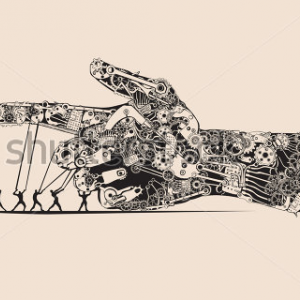
Cindy Brandt writes about faith and culture at cindywords.com. She is the author of Outside In: Ten Christian Voices We Can’t Ignore. She studied Bible/Theology at Wheaton College and holds a Masters of Arts in Theology from Fuller Seminary. She serves on the board of One Day’s Wages, an organization fighting extreme global poverty. She writes from Taiwan, where she lives with her husband and two children on the 33rd floor of a high rise.
Posts By This Author
Culture Wars and Destructive Dialogue
Not too long after being introduced to John 3:16, I was taught Psalm 139:13: “For it was you who formed my inward parts; you knit me together in my mother’s womb.” Now that I was a Christian, it was important I understood that Christians are anti-abortion, that life begins at conception, and that terminating life is nothing short of murder. Throughout college, I carried the cause of the pro-life movement in a symbol tacked on my school bag: a miniature pair of feet, a replica of a 10-week old baby in utero, intricately shaped in sterling silver.
I didn’t think about it. I never HAD to think about it, having never carried an unwanted pregnancy. For me, the pro-life movement was simple, uncomplicated, pretty, and as sanitized as a small silver ornament. That is, until I moved to China, a country well known for its high rate of abortions — including forced abortions, particularly of baby girls.
Hearing God Sing

Image via Sergey Nivens/Shutterstock
What I am learning is that the new normal is not that I no longer experience God, but that God is meeting me in new ways. The new normal is that I don’t need to hear people play guitar telling me to feel God’s love from a stage. I find God’s love in much less conspicuous places, from the stranger behind me who felt too awkward to shake my hand, to the silly doodles my kids were making on the church bulletin. The new normal is that I no longer find authority in celebrity pastors preaching at me, but I do find it listening to unheard voices of small bloggers and older people who aren’t social media savvy.
The new normal is that I hear the "Roman Road" gospel preached and find it dull and superficial, and yet feel overwhelming conviction in the cross lived out by people who forgive their enemies.
The new normal is that although God has not changed, I have changed. And like a parent who stops cooing in baby talk, God is starting to speak in new, fresh ways to me.
Speaking Through the Divide
As a cross-cultural person, I am keenly aware of the vastly different ways we do life. I am a huge champion of creating space for diversity. However, leaning into our differences also serves to make universal aspects of humanity unmistakable. And one thing that binds us is our common experience of suffering. Our compassion and empathy for the suffering of others is powerful enough to break down the thickest walls of ideology.
I think about the areas of our most vehement disputes: the beginning of life (abortion), the end of life (capital punishment, end-of-life care), marriage and children (gay marriage, parenting wars), dignity of work and supporting the family (the economy) — and I see these issues radiate out of the struggle to be human. The pains that love brings to the human experiment threaten with small wedges of disagreement between us until we are fragmented mini-tribes with narrow dogmas.
More Than Numbers: Beyond American Christianity's 'Crisis'
It’s important to listen to the stories told through the numbers as well as the untold stories. As a non-American, it is surprising to hear my brothers and sisters throw out phrases like, “the church is in decline,” when what you are referring to is the church in America. The global church is alive and well and thriving in many areas of the world, and what joy it would be to allow their voices to speak into the congregations of the global North. Many of the polarizing, divisive issues in the American church, such as gay marriage, abortion, and the death penalty, are being discussed by the global church outside the context of the binary lenses of the American left and right. These outside voices can serve to soften the rhetoric hurled by each side, and also give perspective to the priority placed on them in light of the problems faced by the global South.
Question Everything About Your Faith
The definitive characteristic of Christian faith is that it is rooted in a historic event. We are the Resurrection People because the core of our belief, faith, ethics, and future hope lies in the 33 precious years of our God incarnated, culminating in him, the Suffering Servant, being nailed to that old rugged cross, and his subsequent rising from the dead.
The Christian faith has always been about God coming to save us in human form.
Everything we know about what it means to be a Christian is clothed with humanity. Jesus followers learn of what it means to be Christian by way of human relationships. We recite and affirm historical creeds passed down to us through the cloud of witnesses, the generations of believers before us. We are instructed in the moral values that align with Christian teaching by our mothers and fathers, whether biological or spiritual. Our local church community is our ethics classroom, a place where we practice, learn, and grow, working out our salvation and mobilizing the revolution of God in our particular corner of the world.
Easter, the Game Changer
Something has gone awry in our culture when we begin to tell the Resurrection story from a narrative of “The Good Guy Wins.” We love seeing the good guys kick ass. We celebrate rugged heroes like Jack Bauer from the hit TV show 24, even when they kill. So steeped are we in what Walter Wink calls, “the myth of redemptive violence,” we have subsumed the Easter story into this framework.
In cultures where Christianity has become the dominant power, the resurrection of Jesus has been turned into the triumph of the victors. The way “Jesus is Risen” is proclaimed, it sounds like bragging — essentially one-upping those who disagree with us by saying smugly: we win. Easter is used as a trump card to threaten people into joining our side, because we are the side of the victors. Again and again, the church tries to grow by dominating: passing laws discriminating others, fighting legal battles in the courts, using money and clout to sway people into a certain ideology. Easter celebrations at megachurches get bigger and jazzier every year. We are like the disciples who just don’t get it. We argue and argue over which among us is the greatest.
We need to figure out how to tell a different story.
What If Jesus Wasn’t the Answer?
I gave up street evangelizing a long time ago. It was a short-lived career — a few weekends into town with a friend, praying for God to help us meet someone we could share Jesus with. It quickly (thankfully) became clear to me that this business of following God is much better done in the context of long-term relationships with a broader understanding of salvation and mission.
Any time we try to confine the big and beautiful Good News of God into a simplistic message small enough to fit onto a tract or a 10-minute awkward conversation, we cut out too many important details. The truncated gospel of the Four Spiritual Laws requires that we get to the point — Jesus is the answer — as quickly as possible, lest our conversion, I mean, conversation partner gets away from us.
For Jesus to be the answer, there’s got to be a problem, and so we belabor the problem in order to solve it.
The mathematical equation of the gospel made sense to me when I was a child and perhaps into young adulthood. Prove the problem and solve the equation. Everything was simple, organized, and neatly categorized.
Somewhere along the way, it stopped making sense.
Perceiving Reality Differently: #Dressgate and the Church
If you thought I was going to be one of those bloggers who was above using the recent viral #dressgate as blog fodder, you would be wrong. In fact, as soon as the dress started trending, I knew I would be writing about it because it so perfectly encapsulates my message.
By now you have seen the dress, and gone through the stages of denial, bewilderment, and acceptance of how your perception of color differs from the next person. You may have even read The Science of Why No One Agrees on the Color of This Dress. But you may not yet have had a faith writer exegete the profound spiritual significance of the dress. Do not fear, I am here to deliver. Below is a simple Christian Guide to #Dressgate:
A. If you see blue/black: you are a solid Christian. Like a rock, you are steadfast and unchanging. Because rocks are often black.
B. If you see white/gold: we all know only true Christians can see white/gold, as gold signifies the color which paves the streets of heaven, and white, the color of angel’s robes.
C. If you see BOTH colors: you are one of those progressive, liberal, hippie types who is so politically correct you can’t even exclude a color set of a dress.
D. If you can only see one set of colors, but you’re so convinced you can trick your brain into seeing the other that you will spend an entire span of family dinner twitching your face, blinking and winking furiously, twisting your head at ridiculous angles at the photo, then you are just my husband.
I’m C, of course. The freaky dress does crazy mental magic on my brain, switching colors on me spontaneously, forcing me to existentially question every life decision I have ever made with my faulty, cognitive synapses.
And I’m kidding. Please, don’t be sending me hate mail about the true Christian thing, I’m kidding.
More Christian Than Celebrity
The biggest event of Hollywood industry has just wound down. The rich and glamorous have walked down the red carpet in their designer gowns, the famous people took home trophies, and the Oscars are over for another year.
It is a lot of fun to “ooh” and “aah” over celebrities. I love to dole out opinions on red carpet fashion choices and chuckle at Twitter making fun of Matthew McConaughey’s facial hair. But overall, I think celebrity culture is quite unhealthy. Too much power and fame seems to corrupt even the best of us, and being in the spotlight for too long takes its toll on the human psyche. We should be fostering meaningful relationships with one another instead of developing a system that makes it possible for the celebrity to crave constant attention and for the crowd to follow blindly in an unthoughtful, mob-like fashion.
But because the system is already in place, this mechanism within culture to put people on pedestals for us to blindly adore — when Christians begin to share art and ideas publicly, we have seamlessly co-opted the same model to create a niche Christian celebrity culture.
The Boy Who Did Not Come Back from Heaven
In 2010, the book, The Boy Who Came Back From Heaven, was released. At the time, I believe I gave this news about 0.3 percent of my attention, and 0.1 percent was spent lamenting terrible theology prevalent in the popular Christian book market.
I don’t believe we die and are snatched up to heaven, but that is subject for another post — or better yet, go read N.T. Wright’s Surprised by Hope. Another 0.1 percent of my energies went toward flinching and cringing at the way this boy was IMO being exploited for book sales. In hindsight, I should have spent more time praying for him and his mother, whose cries for truth has been silenced by the powerful machine of the publishing industry. The last 0.1 percent was energy exerted to shaking my head at the allure of sensationalism — enough to shift millions of books and a movie deal.
It came as no surprise when last week The Boy Who Came Back From Heaven retracted his story.
When Tina Fey and Amy Poehler Are My People
Living in a different time zone, I was not able to watch the live coverage of the Golden Globes, but I turned to the next best thing: Twitter. It didn’t take long before the newsfeed sounded out a collective gasp from Tina Fey and Amy Poehler’s Bill Cosby rape joke:
“Sleeping Beauty just thought she was getting coffee with Bill Cosby.”
Some may have thought the joke too offensive, that rape is too serious a subject to use as speech fodder, but I found it genius. Fey/Poehler called out the offense of a powerful man in his own arena, the world of entertainment where he gained his prestige, against the women he allegedly assaulted. They brought a buried injustice up to the surface, making the rich and glamorous squirm with discomfort — is that not the work of modern-day prophetesses? The fact that it came from two women who know first hand the misogyny in the male-dominated industry of comedy added another layer of irony and punch to the boundary-stretching joke. Tina Fey and Amy Poehler, women who are smart, talented, and gutsy enough to call out injustice, make me proud to be a woman. They are my people.
This past weekend, I’ve been following another event: the annual Gay Christian Network Conference in Portland. I take seriously my charge to find beauty in the margins. And whatever your stance is on the LGBT Christian debate, the fact that mainstream Christian media was conspicuously silent on covering the GCN conference is proof that within evangelicalism, gay Christians still live at the margins.
Born Again, or Blind?
I am more and more convinced that beauty lies in the margins.
Raised in evangelicalism, we often prayed to reach those who remain in the darkness, that God would open their eyes and see the truth. We had been born again. A veil had been magically lifted off our eyes, welcoming us into the land of all that is bright and right. Like the blind man in the Gospel of John, we proclaim, “I was blind, but now I see.” Those who believe now possess some sort of special knowledge inaccessible to others, and we are tasked to go and lift the blinders off as many as possible.
It sounds a bit arrogant, which has been a common accusation against evangelical Christians. But every conversion experience is a form of turning from darkness to light. An a-ha moment, a lived miracle, a season of wrestling with doubt and crisis that somehow brought the person to a divine encounter with God. These stories ought to be honored and not dismissed. Something has changed, and it is worth celebrating a liberation into hope. I marvel at genuine, earnest faith.
The problem is when we have become blinded by our light.
Can You See Your God Through My Spectacles?
We all wear a set of spectacles. Everyone does. These lenses dictate the way we view life. They determine the habits we make, what to eat, when to sleep, when to marry, and how to work. They assign value to our lives, determining what is meaningful: family, faith, honor, love.
If you are like me, you wear two pairs of spectacles — some people in the world wear three or more.
What I learned living cross-culturally as a Christian is that you can see Jesus wearing different spectacles. You do not have to abandon your pair, or switch it out for a new one, in order to find Jesus. You do not have to forsake the cultural values you were assigned at birth, taught by your parents, and passed down by your ancestors in order to know Jesus. You find Jesus by looking through them.
All I Want for Christmas Is Uncertainty
Have you ever been enamored by a child’s sense of wonder? Their incredulous awe in myths like the tooth fairy and Santa, their wide-eyed anticipation of unwrapping a present?
We are most inspired by the unknown.
A magic trick — how did they do it?!
A movie with surprising plot twists.
A news scandal shrouded with mystery.
We are drawn to the unknown because it tickles the innate sense of curiosity within us to discover and explore. Mystery invites participation, not for the sake of removing what is unknown, but to ignite a passion for learning beyond what is certain and be changed through the process.
Why is it then, we insist on equating our Christian faith to certainty? We sing about a Blessed Assurance and hold intensive meetings to discuss the essentials of faith. We share testimonies of God stories to shelve any doubts of God’s existence. We preach the same sermons, pray the same prayers, tell the same stories, week after week to convince ourselves it all is still true.
Is this what our Christianity has been reduced to, more of the same? I am sorry, but I simply cannot muster up anymore enthusiasm for such a formulaic faith; it’s like taking elementary classes all over again. I already know that two plus two equals four.
I am longing for the gift of uncertainty, a type of profound mystery that welcomes questions, a faith that requires a leap of faith to sustain.
'Peace, Peace.' But For Whom?
Peace, with its connotation of tranquility and stillness, is the Christian’s most misunderstood concept. We have long sought to keep peace by silencing dissent under the guise of pursuing unity, coated with a zealous concern for niceties, unwilling to budge a status quo. We forget to ask the crucial question: for whom do we keep peace?
Wherever peace is elusive, the first ones to suffer are the vulnerable.
When corporations engage in legal battles, employees who don’t get a vote have the most at stake. When marital tensions rise high, children’s tender spirits lay at the parents’ mercy. When war ravages a country, the displaced peoples helplessly suffer.
When keeping the peace only benefits the powerful, it is not a Christian peace. The sweet baby Jesus portrayed in sentimental Christmas cards has taken an abrupt departure from the kind of peace we see Jesus embody in Scripture. Even as an infant, the baby Jesus so disrupted the power authorities of the day that sent them scrambling into every home killing firstborn baby boys.
Christian peace is not about coddling people’s fear of conflict. It isn’t about making sure everyone is comfortable. It does not silence those for whom a lack of peace is a life or death situation. The irony is that often, the ones with feeble power are the ones who are told to keep peace and remain silent.
When the society is disrupted by scandalizing conflict — whether it is the Bill Cosby rape accusations, or the “harsh disciplinary methods” of certain celebrity parents, or an entire neighborhood weary of losing their young men to police violence — the Christian dare not keep peace by silencing the voice of the victims.
An Open Letter to Missionaries
Dear Missionaries,
I like to tell people I’m a missionary convert, because I wear this genesis of my faith journey proudly, like a badge of honor. I heard the story of Jesus from your lips, sang the songs of worship in your language, and prayed for the concerns in your heart. You taught me how to be Christian.
I learned from your lavish generosity and boundless love and affection. I also learned how to do Christmas. One day in my freshman year of high school, I asked my Chinese parents if we could find a Christmas tree. This was before Christmas became commercialized in Taiwan, so all I could find was a tacky, tiny, plastic tree, which I set up delightfully in the corner of our living room. I arranged neatly wrapped fake presents under my wannabe tree and meticulously set up some lights. I longed for that warm feeling I felt in your homes, the atmosphere I saw in American movies. I wanted to be like you; if only I could have convinced my parents to do Christmas like you did, with gifts, candles, and prayers.
Little did I know your celebrations were crippled by your overseas living because, like me, you also could only find dinky little plastic trees. When I visited your home country, I saw the full potential of CHRISTMAS unleashed, with real trees as tall as houses and white lights, icicle lights, flashing lights, lights shaped like reindeer, elaborate nativity sets, and ridiculous amounts of presents and candy. I thought, wow, is this how the Christians do Christmas?
My Cause Is Better than Your Cause
A while back, a blog post speaking into the pain of miscarriage was making its rounds on the Internet. Having never miscarried (that I know of), or grieved the death of any child, I asked my friend who lost her two-month-old son whether she felt highlighting the pain of miscarriage diminishes the story of her own tragedy. She replied:
“It is not very helpful to compare pain.”
But how often do we do just that? There is a phenomenon of what I call, “First-World-Problem-Shaming,” where we make people feel bad about their anxieties because somewhere in the world children are starving. I don’t know about you, but in general, I feel WORSE after being reminded of greater problems in the world in response to my petty issues, not better. We compare our pains, assigning degrees of severity attached to the problem, deem one pain more worthy of compassion than the other, and manage one another’s grief as if it can be contained by our metrics. Yet everything we know about grief is that it defies our expectations, bowling us over unsuspectingly or releasing us with surprising turns. Everyone grieves in their own way.
This dynamic carries over to the way we do justice.
When Prayer Becomes Control
Andrew W.K. at the Village Voice received a question from someone whose brother was diagnosed with cancer. In his grief, he is frustrated by his grandma’s prayers and sees them as “superstitious nonsense.” Andrew’s brilliant response is a very worthwhile read, in which he positions prayer as a posture of humility, a deep realization of our smallness.
When senseless tragedy occurs, people of faith often rush to explain and control. As finite human beings, we are limited in our knowledge and power, which makes us uncomfortable. When we encounter something incomprehensible, we are driven to explain it. When a situation reels out of control, we long to control it. We invite God to fill those gaps of our discomfort, our lack of understanding and control.
We look for redemption stories, the ways God is bringing about good through a tragic situation. We do this to avoid letting the grief overwhelm us. Like grandma, we pray because we are hoping to claim some power in our helplessness. Our prayers end up being more beneficial for ourselves than the person we are actually praying for.
Unfortunately, what happens then is we cease to need God beyond the quick explanation. We’ve tidied up the situation with reverent prayers and spiritual meaning. We’ve quickly salvaged the ecosystem of our faith despite a tragic intrusive incident — our belief in the God of the gaps remain intact. Everything stays the same. When we do this, we are making God into an idol, one that explains and controls according to our sensibilities.
What Saved My Faith
It was the beauty on the outside that drew me away.
Before social justice became trendy among evangelicals, people of all denominations, faiths, and philosophies had already been steadily working in the trenches without fanfare, caring for the least of these with a quiet strength.
Through seminary, I learned to grapple with justice being at the heart of the Christian Gospel — dignity, equality, and right to life for all — I marched out into the real world with zeal and vigor to champion the rights of the oppressed in the name of Jesus. However, I discovered the people who were doing this work often had no identification with Christianity, that those outside of church were behaving more Christian-ly than some inside.
I admired Nicholas Kristof, a self proclaimed nonreligious reporter, who tirelessly sheds light on humanitarian concerns.
I adored Malala, a Muslim, who stood up to the Taliban to bravely demand a right to education for girls.
I reflected on the justice heroes of recent history, people like Gandhi and countless other humanitarian workers who don’t claim the Christian faith for their own.
It disoriented me because for so long I believed it was only through Christ that one can walk in righteous paths; that without the Truth (which had been so narrowly summed up for me in John 3:16), everything was meaningless. I didn’t have an interpretive lens to categorize beauty that existed outside of the vessel I was told contained the only beauty to be found: the evangelical Christian church.
How I Kissed Evangelizing Goodbye
I went to the mecca of evangelicalism for college — beautiful campus in the suburbs of Chicago, where I received a scholarship from none other than the Pope of Evangelicalism, Billy Graham, for my work in street evangelism. As in, speaking to random strangers on the street in order to convert them to Christianity. Post graduation, I became a missionary, the Protestant equivalent of achieving sainthood.
I look back on that girl on fire and marvel at her earnest faith. If I could, I would reach back and massage the tense knots out of her high-strung shoulders, weary from carrying the weight of her neighbors’ eternal destinies. I would wistfully explain to her that the first person she tried to witness to, that gentle, drunken, homeless woman named Kathy, needed more than my rehearsed Roman Road to salvation. Then I would break the Temporal Prime Directive and reveal to her that one day she would become more interested in being evangelized than evangelizing.
The truth is, I’m just better at being evangelized. It’s probably how I was so easily converted at the tender age of 12. The young Christian is expected to learn how to share their testimony: their story of how God changes your life. By the time I was in my twenties, I had given my testimony a bajillion times.
But my own story often bored me.


















